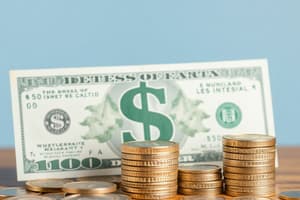Podcast
Questions and Answers
Which of the following are functions of money? (Select all that apply)
Which of the following are functions of money? (Select all that apply)
- Medium of exchange (correct)
- Store of value (correct)
- Standard of value (unit of account) (correct)
- None of the above
Which of the following are characteristics of money? (Select all that apply)
Which of the following are characteristics of money? (Select all that apply)
- Durability (correct)
- Portability (correct)
- Divisibility (correct)
- All of the above (correct)
What is durability?
What is durability?
When money lasts for a while.
What is portability?
What is portability?
What is divisibility?
What is divisibility?
What is uniformity?
What is uniformity?
What is limited supply?
What is limited supply?
What is acceptability?
What is acceptability?
What are the types of money? (Select all that apply)
What are the types of money? (Select all that apply)
What is fiat money?
What is fiat money?
What is commodity money?
What is commodity money?
What is representative money?
What is representative money?
What is default?
What is default?
Flashcards are hidden until you start studying
Study Notes
Functions of Money
- Serves as a medium of exchange, facilitating trade and transactions.
- Acts as a store of value, preserving purchasing power over time.
- Provides a standard of value (unit of account), allowing for the comparison of different goods and services.
Characteristics of Money
- Durability: Money must withstand physical wear and tear to retain its functionality.
- Portability: Money should be easy to carry and transport, enhancing its usability in transactions.
- Divisibility: Money can be divided into smaller units without losing its value, accommodating various transaction sizes.
- Uniformity: Ensures standardization in form, which means each unit is identical in value and appearance.
- Limited Supply: A controlled quantity of money in circulation prevents inflation and maintains value; involves recycling of currency.
- Acceptability: Money must be widely accepted and trusted by users as a valid medium for transactions.
Types of Money
- Fiat Money: Has value assigned by government decree rather than intrinsic worth; its legitimacy comes from legal status.
- Commodity Money: Physical items with inherent value (such as gold or silver) that are used as a medium of exchange.
- Representative Money: Represents a claim on a commodity; for instance, receipts that confer ownership of a specific amount of a commodity.
Additional Term
- Default: The failure to repay a loan, which can have serious financial consequences for the borrower.
Studying That Suits You
Use AI to generate personalized quizzes and flashcards to suit your learning preferences.




